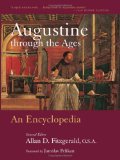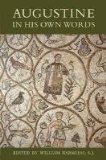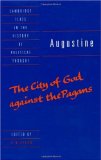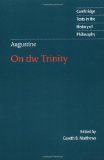|
Relevant
books
available at Amazon
Many Augustine
translations
and studies with links to Amazon
A selection below
 
Peter Brown biography
--------
 
Allan Fitzgerald --------
 
Henry Chadwick
a short indroduction --------
 
William Harmless.
Extracts from several of Augustine's main works --------
 
Henry Chadwick's translation of "Confessions" --------
 
R.W.Dyson's translation of "The City of God" --------
 
R.P.H. Green's translation of "On Christian Teaching" --------
 
Gareth Matthews' translation of "On The Trinity" (books 8 - 15) |
69. So Moses, too, who was so faithful a servant of God in all his
house; the minister of the holy, just, and good law; of whose character the
apostle speaks in the words here quoted; the minister also of the symbols which,
though not conferring salvation, promised the Saviour, as the Saviour Himself
shows, when He says, "If ye believed Moses, ye would also believe me, for he
wrote of me,"—from which passage we have already sufficiently answered the
presumptuous cavils of the Manichæans;—this Moses, the servant of the living,
the true, the most high God, that made heaven and earth, not of a foreign
substance, but of nothing—not from the pressure of necessity, but from plenitude
of goodness—not by the suffering of His members, but by the power of His
word;—this Moses, who humbly put from him this high ministry, but obediently
accepted it, and faithfully kept it, and diligently fulfilled it; who ruled the
people with vigilance, reproved them with vehemence, loved them with fervor, and
bore with them in patience, standing for his subjects before God to receive His
counsel, and to appease His wrath;—this great and good man is not to be judged
of from Faustus’ malicious representations, but from what is said by God, whose
word is a true expression of His true opinion of this man, whom He knew because
He made him. For the sins of men are also known to God, though He is not their
author; but He takes notice of them as a judge in those who refuse to own them,
and pardons them as a father in those who make confession. His servant Moses, as
thus described, we love and admire and to the best of our power imitate, coming
indeed far short of his merits, though we have killed no Egyptian, nor plundered
any one, nor carried on any war; which actions of Moses were in one case
prompted by the zeal of the future champion of his people, and in the other
cases commanded by God.
70. It might be shown that, though Moses slew the Egyptian, without being
commanded by God, the action was divinely permitted, as, from the prophetic
character of Moses, it prefigured something in the future. Now however, I do not
use this argument, but view the action as having no symbolical meaning. In the
light, then, of the eternal law, it was wrong for one who had no legal authority
to kill the man, even though he was a bad character, besides being the
aggressor. But in minds where great virtue is to come, there is often an early
crop of vices, in which we may still discern a disposition for some particular
virtue, which will come when the mind is duly cultivated. For as farmers, when
they see land bringing forth huge crops, though of weeds, pronounce it good for
corn; or when they see wild creepers, which have to be rooted out, still
consider the land good for useful vines; and when they see a hill covered with
wild olives, conclude that with culture it will produce good fruit: so the
disposition of mind which led Moses to take the law into his own hands, to
prevent the wrong done to his brother, living among strangers, by a wicked
citizen of the country from being unrequited, was not unfit for the production
of virtue, but from want of culture gave signs of its productiveness in an
unjustifiable manner. He who afterwards, by His angel, called Moses on Mount
Sinai, with the divine commission to liberate the people of Israel from Egypt,
and who trained him to obedience by the miraculous appearance in the bush
burning but not consumed, and by instructing him in his ministry, was the same
who, by the call addressed from heaven to Saul when persecuting the Church,
humbled him, raised him up, and animated him; or in figurative words, by this
stroke He cut off the branch, grafted it, and made it fruitful. For the fierce
energy of Paul, when in his zeal for hereditary traditions he persecuted the
Church, thinking that he was doing God service, was like a crop of weeds showing
great signs of productiveness. It was the same in Peter, when he took his sword
out of its sheath to defend the Lord, and cut off the right ear of an assailant,
when the Lord rebuked him with something like a threat, saying, "Put up thy
sword into its sheath; for he that taketh the sword shall perish by the sword."
To take the sword is to use weapons against a man’s life, without the sanction
of the constituted authority. The Lord, indeed, had told His disciples to carry
a sword; but He did not tell them to use it. But that after this sin Peter
should become a pastor of the Church was no more improper than that Moses, after
smiting the Egyptian, should become the leader of the congregation. In both
cases the trespass originated not in inveterate cruelty, but in a hasty zeal
which admitted of correction. In both cases there was resentment against injury,
accompanied in one case by love for a brother, and in the other by love, though
still carnal, of the Lord. Here was evil to be subdued or rooted out; but the
heart with such capacities needed only, like good soil, to be cultivated to make
it fruitful in virtue.
71. Then, as for Faustus’ objection to the spoiling of the Egyptians, he knows
not what he says. In this Moses not only did not sin, but it would have been sin
not to do it. It was by the command of God, who, from His knowledge both of the
actions and of the hearts of men, can decide on what every one should be made to
suffer, and through whose agency. The people at that time were still carnal, and
engrossed with earthly affections; while the Egyptians were in open rebellion
against God, for they used the gold, God’s creature, in the service of idols, to
the dishonor of the Creator, and they had grievously oppressed strangers by
making them work without pay. Thus the Egyptians deserved the punishment, and
the Israelites were suitably employed in inflicting it. Perhaps, indeed, it was
not so much a command as a permission to the Hebrews to act in the matter
according to their own inclinations; and God, in sending the message by Moses,
only wished that they should thus be informed of His permission. There may also
have been mysterious reasons for what God said to the people on this matter. At
any rate, God’s commands are to be submissively received, not to be argued
against. The apostle says, "Who hath known the mind of the Lord? or who hath
been His counsellor?" Whether, then, the reason was what I have said, or whether
in the secret appointment of God, there was some unknown reason for His telling
the people by Moses to borrow things from the Egyptians, and to take them away
with them, this remains certain, that this was said for some good reason, and
that Moses could not lawfully have done otherwise than God told him, leaving to
God the reason of the command, while the servant’s duty is to obey.
72. But, says Faustus, it cannot be admitted that the true God, who is also
good, ever gave such a command. I answer, such a command can be rightly given by
no other than the true and good God, who alone knows the suitable command in
every case, and who alone is incapable of inflicting unmerited suffering on any
one. This ignorant and spurious goodness of the human heart may as well deny
what Christ says, and object to the wicked being made to suffer by the good God,
when He shall say to the angels, "Gather first the tares into bundles to burn
them." The servants, however, were stopped when they wished to do this
prematurely: "Lest by chance, when ye would gather the tares, ye root up the
wheat also with them." Thus the true and good God alone knows when, to whom, and
by whom to order anything, or to permit anything. In the same way, this human
goodness, or folly rather, might object to the Lord’s permitting the devils to
enter the swine, which they asked to be allowed to do with a mischievous intent,
especially as the Manichæans believe that not only pigs, but the vilest insects,
have human souls. But setting aside these absurd notions, this is undeniable,
that our Lord Jesus Christ, the only son of God, and therefore the true and good
God, permitted the destruction of swine belonging to strangers, implying loss of
life and of a great amount of property, at the request of devils. No one can be
so insane as to suppose that Christ could not have driven the devils out of the
men without gratifying their malice by the destruction of the swine. If, then,
the Creator and Governor of all natures, in His superintendence, which, though
mysterious, is ever just, indulged the violent and unjust inclination of those
lost spirits already doomed to eternal fire, why should not the Egyptians, who
were unrighteous oppressors, be spoiled by the Hebrews, a free people, who would
claim payment for their enforced and painful toil, especially as the earthly
possessions which they thus lost were used by the Egyptians in their impious
rites, to the dishonor of the Creator? Still, if Moses had originated this
order, or if the people had done it spontaneously, undoubtedly it would have
been sinful; and perhaps the people did sin, not in doing what God commanded or
permitted, but in some desire of their own for what they took. The permission
given to this action by divine authority was in accordance with the just and
good counsel of Him who uses punishments both to restrain the wicked and to
educate His own people; who knows also how to give more advanced precepts to
those able to bear them, while He begins on a lower scale in the treatment of
the feeble. As for Moses, he can be blamed neither for coveting the property,
nor for disputing, in any instance, the divine authority.
73. According to the eternal law, which requires the preservation of natural
order, and forbids the transgression of it, some actions have an indifferent
character, so that men are blamed for presumption if they do them without being
called upon, while they are deservedly praised for doing them when required. The
act, the agent, and the authority for the action are all of great importance in
the order of nature. For Abraham to sacrifice his son of his own accord is
shocking madness. His doing so at the command of God proves him faithful and
submissive. This is so loudly proclaimed by the very voice of truth, that
Faustus, eagerly rummaging for some fault, and reduced at last to slanderous
charges, has not the boldness to attack this action. It is scarcely possible
that he can have forgotten a deed so famous, that it recurs to the mind of
itself without any study or reflection, and is in fact repeated by so many
tongues, and portrayed in so many places, that no one can pretend to shut his
eyes or his ears to it. If, therefore, while Abraham’s killing his son of his
own accord would have been unnatural, his doing it at the command of God shows
not only guiltless but praiseworthy compliance, why does Faustus blame Moses for
spoiling the Egyptians? Your feeling of disapproval for the mere human action
should be restrained by a regard for the divine sanction. Will you venture to
blame God Himself for desiring such actions? Then "Get thee behind me, Satan,
for thou understandest not the things which be of God, but those which be of
men." Would that this rebuke might accomplish in you what it did in Peter, and
that you might hereafter preach the truth concerning God, which you now, judging
by feeble sense, find fault with! as Peter became a zealous messenger to
announce to the Gentiles what he objected to at first, when the Lord spoke of it
as His intention.
74. Now, if this explanation suffices to satisfy human obstinacy and perverse
misinterpretation of right actions of the vast difference between the indulgence
of passion and presumption on the part of men, and obedience to the command of
God, who knows what to permit or to order, and also the time and the persons,
and the due action or suffering in each case, the account of the wars of Moses
will not excite surprise or abhorrence, for in wars carried on by divine
command, he showed not ferocity but obedience; and God in giving the command,
acted not in cruelty, but in righteous retribution, giving to all what they
deserved, and warning those who needed warning. What is the evil in war? Is it
the death of some who will soon die in any case, that others may live in
peaceful subjection? This is mere cowardly dislike, not any religious feeling.
The real evils in war are love of violence, revengeful cruelty, fierce and
implacable enmity, wild resistance, and the lust of power, and such like; and it
is generally to punish these things, when force is required to inflict the
punishment, that, in obedience to God or some lawful authority, good men
undertake wars, when they find themselves in such a position as regards the
conduct of human affairs, that right conduct requires them to act, or to make
others act in this way. Otherwise John, when the soldiers who came to be
baptized asked, What shall we do? would have replied, Throw away your arms; give
up the service; never strike, or wound, or disable any one. But knowing that
such actions in battle were not murderous but authorized by law, and that the
soldiers did not thus avenge themselves, but defend the public safety, he
replied, "Do violence to no man, accuse no man falsely, and be content with your
wages." But as the Manichæans are in the habit of speaking evil of John, let
them hear the Lord Jesus Christ Himself ordering this money to be given to Cæsar,
which John tells the soldiers to be content with. "Give," He says, "to Cæsar the
things that are Cæsar’s." For tribute-money is given on purpose to pay the
soldiers for war. Again, in the case of the centurion who said, "I am a man
under authority, and have soldiers under me: and I say to one, Go, and he goeth;
and to another, Come, and he cometh; and to my servant, Do this, and he doeth
it," Christ gave due praise to his faith; He did not tell him to leave the
service. But there is no need here to enter on the long discussion of just and
unjust ways.
75. A great deal depends on the causes for which men undertake wars, and on the
authority they have for doing so; for the natural order which seeks the peace of
mankind, ordains that the monarch should have the power of undertaking war if he
thinks it advisable, and that the soldiers should perform their military duties
in behalf of the peace and safety of the community. When war is undertaken in
obedience to God, who would rebuke, or humble, or crush the pride of man, it
must be allowed to be a righteous war; for even the wars which arise from human
passion cannot harm the eternal well-being of God, nor even hurt His saints; for
in the trial of their patience, and the chastening of their spirit, and in
bearing fatherly correction, they are rather benefited than injured. No one can
have any power against them but what is given him from above. For there is no
power but of God, who either orders or permits. Since, therefore, a righteous
man, serving it may be under an ungodly king, may do the duty belonging to his
position in the State in fighting by the order of his sovereign,—for in some
cases it is plainly the will of God that he should fight, and in others, where
this is not so plain, it may be an unrighteous command on the part of the king,
while the soldier is innocent, because his position makes obedience a duty,—how
much more must the man be blameless who carries on war on the authority of God,
of whom every one who serves Him knows that He can never require what is wrong?
76. If it is supposed that God could not enjoin warfare, because in after times
it was said by the Lord Jesus Christ, "I say unto you, That ye resist not evil:
but if any one strike thee on the right cheek, turn to him the left also," the
answer is, that what is here required is not a bodily action, but an inward
disposition. The sacred seat of virtue is the heart, and such were the hearts of
our fathers, the righteous men of old. But order required such a regulation of
events, and such a distinction of times, as to show first of all that even
earthly blessings (for so temporal kingdoms and victory over enemies are
considered to be, and these are the things which the community of the ungodly
all over the world are continually begging from idols and devils) are entirely
under the control and at the disposal of the one true God. Thus, under the Old
Testament, the secret of the kingdom of heaven, which was to be disclosed in due
time, was veiled, and so far obscured, in the disguise of earthly promises. But
when the fullness of time came for the revelation of the New Testament, which
was hidden under the types of the Old, clear testimony was to be borne to the
truth, that there is another life for which this life ought to be disregarded,
and another kingdom for which the opposition of all earthly kingdoms should be
patiently borne. Thus the name martyrs, which means witnesses, was given to
those who, by the will of God, bore this testimony, by their confessions, their
sufferings, and their death. The number of such witnesses is so great, that if
it pleased Christ—who called Saul by a voice from heaven, and having changed him
from a wolf to a sheep, sent him into the midst of wolves—to unite them all in
one army, and to give them success in battle, as He gave to the Hebrews, what
nation could withstand them? what kingdom would remain unsubdued? But as the
doctrine of the New Testament is, that we must serve God not for temporal
happiness in this life, but for eternal felicity hereafter, this truth was most
strikingly confirmed by the patient endurance of what is commonly called
adversity for the sake of that felicity. So in fullness of time the Son of God,
made of a woman, made under the law, that He might redeem them that were under
the law, made of the seed of David according to the flesh sends His disciples as
sheep into the midst of wolves, and bids them not fear those that can kill the
body, but cannot kill the soul, and promises that even the body will be entirely
restored, so that not a hair shall be lost. Peter’s sword He orders back into
its sheath, restoring as it was before the ear of His enemy that had been cut
off. He says that He could obtain legions of angels to destroy His enemies, but
that He must drink the cup which His Father’s will had given Him. He sets the
example of drinking this cup, then hands it to His followers, manifesting thus,
both in word and deed, the grace of patience. Therefore God raised Him from the
dead, and has given Him a name which is above every name; that in the name of
Jesus every knee should bow, of things in heaven and of things in earth, and of
things under the earth; and that every tongue should confess that Jesus is Lord,
to the glory of God the Father. The patriarchs and prophets, then, have a
kingdom in this world, to show that these kingdoms, too, are given and taken
away by God: the apostles and martyrs had no kingdom here, to show the superior
desirableness of the kingdom of heaven. The patriarchs and prophets waged wars
for their kingdoms in order to show that will of God also gives such victories;
the apostles and martyrs were slain without resistance in order to teach that it
is a better victory to suffer death for faith in the truth.* The prophets,
however, could even in those times die for the truth, as the Lord Himself says,
"From the blood of Abel to the blood of Zacharia;" and in these days, since the
commencement of the fulfillment of what is prophesied in the psalm of Christ,
under the figure of Solomon, which means the peacemaker, as Christ is our peace,
"All kings of the earth shall bow to Him, all nations shall serve Him," we have
seen Christian emperors, who have put all their confidence in Christ, gaining
splendid victories over ungodly enemies, whose hope was in the rites of idolatry
and devil-worship. There are public and undeniable proofs of the fact, that on
one side the prognostications of devils were found to be fallacious, and on the
other, the predictions of saints were a means of support; and we have now
writings in which those facts are recorded.
|

